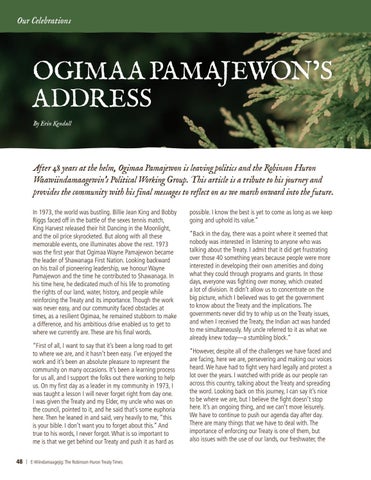Our Celebrations
OGIMAA PAMAJEWON’S ADDRESS By Erin Kendall
After 48 years at the helm, Ogimaa Pamajewon is leaving politics and the Robinson Huron Waawiindamaagewin’s Political Working Group. This article is a tribute to his journey and provides the community with his final messages to reflect on as we march onward into the future. In 1973, the world was bustling. Billie Jean King and Bobby Riggs faced off in the battle of the sexes tennis match, King Harvest released their hit Dancing in the Moonlight, and the oil price skyrocketed. But along with all these memorable events, one illuminates above the rest. 1973 was the first year that Ogimaa Wayne Pamajewon became the leader of Shawanaga First Nation. Looking backward on his trail of pioneering leadership, we honour Wayne Pamajewon and the time he contributed to Shawanaga. In his time here, he dedicated much of his life to promoting the rights of our land, water, history, and people while reinforcing the Treaty and its importance. Though the work was never easy, and our community faced obstacles at times, as a resilient Ogimaa, he remained stubborn to make a difference, and his ambitious drive enabled us to get to where we currently are. These are his final words. “First of all, I want to say that it’s been a long road to get to where we are, and it hasn’t been easy. I’ve enjoyed the work and it’s been an absolute pleasure to represent the community on many occasions. It’s been a learning process for us all, and I support the folks out there working to help us. On my first day as a leader in my community in 1973, I was taught a lesson I will never forget right from day one. I was given the Treaty and my Elder, my uncle who was on the council, pointed to it, and he said that’s some euphoria here. Then he leaned in and said, very heavily to me, “this is your bible. I don’t want you to forget about this.” And true to his words, I never forgot. What is so important to me is that we get behind our Treaty and push it as hard as 48
| E-Wiindamaagejig: The Robinson Huron Treaty Times
possible. I know the best is yet to come as long as we keep going and uphold its value.” “Back in the day, there was a point where it seemed that nobody was interested in listening to anyone who was talking about the Treaty. I admit that it did get frustrating over those 40 something years because people were more interested in developing their own amenities and doing what they could through programs and grants. In those days, everyone was fighting over money, which created a lot of division. It didn’t allow us to concentrate on the big picture, which I believed was to get the government to know about the Treaty and the implications. The governments never did try to whip us on the Treaty issues, and when I received the Treaty, the Indian act was handed to me simultaneously. My uncle referred to it as what we already knew today—a stumbling block.” “However, despite all of the challenges we have faced and are facing, here we are, persevering and making our voices heard. We have had to fight very hard legally and protest a lot over the years. I watched with pride as our people ran across this country, talking about the Treaty and spreading the word. Looking back on this journey, I can say it’s nice to be where we are, but I believe the fight doesn’t stop here. It’s an ongoing thing, and we can’t move leisurely. We have to continue to push our agenda day after day. There are many things that we have to deal with. The importance of enforcing our Treaty is one of them, but also issues with the use of our lands, our freshwater, the















